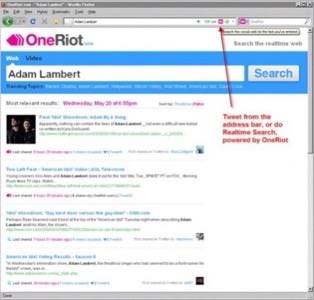Real-time social search outfit OneRiot today announced their API and partnership program for adding real-time search capabilities to browser add-ons, desktop applications, social websites and other services.

The mind reels at the possible use cases for such an API: Blogs and news sites could track and serve real-time, hot-topic links. Businesses could turn out impressive buzz-monitoring applications. Social action networks could use it to spread the word on civic engagement. Almost any site or organization could imaginatively and profitably employ OneRiot’s instant link-indexing algorithm (which we think actually works better than many similar products). It just happens that TwitterBar was the first.
“We have plenty of very interesting partners,” said Tobias Peggs, OneRiot’s business initiative frontman. He revealed an additional two partnerships: Firefox/IE search add-ons WebMynd and Surf Canyon.
Peggs continued, “The real-time results are much more buzzy than static results, which pushes user adoption much more because the results resonate with what users want. Real-time search results can inform a discussion users are having with their friends.”
TwitterBar, the first OneRiot partner, is a Firefox add-on that allows users to send Twitter updates directly from the Firefox address bar. Although the TwitterBar functionality is currently “very alpha” (to coin a kind, new term for early-launching tech) the implications of instantly gleaning and sharing real-time results are fascinating, especially considering that social web sharing boosts a link’s OneRiot score.
“If you look at the real-time search players out there,” said Peggs, “the key for them is to get distribution. Clearly, a number of users are going to turn up at MyRealTimeSearchEnginge.com, but the way to drive user adoption is to distribute. You need to be very confident that you can scale. What the API does is prove that OneRiot is a company that believes they can scale.”
Why is OneRiot so confident in its ability to scale? While Peggs wouldn’t comment on back-end server tech specifics, he did say, “We have got a world-class team of search experts. We have more PhDs than you can shake a stick at. They have invented some really smart ways to process an incredible amount of social signals in real time and deliver results back. It’s a combination of team and technology that’s backed up by internal testing. We know what we can support, and we’re excited for other partners to adopt it and start hammering away.”
The OneRiot API is for developers of looking to enhance their user experience with realtime web search powered by OneRiot. The OneRiot API is free and available by request.
We look forward to seeing who takes on this opportunity. In the meantime, here are a few screenshots of the OneRiot API in action:




















